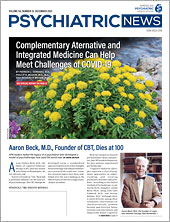First described in 1981 in the United States and initially thought to be contained, HIV spread to every region of the world by 1984, to become a major global health challenge of the late 20th century. Similarly, in 2020, COVID-19 navigated waters of economic disputes and geopolitical tensions in a polarized world and imposed itself as a formidable challenge to all aspects of modern life, most notably affecting health care. Although HIV is transmitted sexually and parenterally and COVID-19 by droplet infection, we have learned that both can have profound psychological consequences, and that patient treatment requires the collaboration of medicine, infectious disease, and psychiatry. While consultation-liaison psychiatrists may be the first to be called, all psychiatrists and mental health clinicians can help with the prevention of transmission and care of people with HIV or COVID-19. From both illnesses we have also learned that having a major infectious illness can lead to stigma and discrimination by members of the community and then to a considerable sense of shame on the part of the patient.
Discussion
COVID-19 has proliferated throughout the United States and worldwide and continues to be a threat as we mount a global response to extinguish it. The arrival of a new virus with unknown health effects and the fear of its potential to cause severe consequences brought to memory the early period of the AIDS pandemic and its devastating impact on affected communities. Like HIV and impacted by misinformation, stigma, and racial bias, COVID-19 disproportionally affects vulnerable members of the population, already subject to health and socioeconomic inequalities. The successful prevention and end of the pandemic will be based not only on the science of vaccines and medical treatment but also on an understanding of the psychiatric aspects of (non)adherence to prevention and care.
As the HIV pandemic marks its 40th anniversary, some lessons apply to the COVID-19 pandemic.
First, the stigma, shaming, and discrimination associated with major infectious illnesses can be directed both at patients, suspected patients, and even health care professionals and lead to nonadherence to preventive actions and care. While the issue of stigma arose in the early stages of COVID-19, an educated health information approach learned from HIV quickly dispersed the initial stigma and helped promote adherence to preventive actions and respect for health care workers and survivors. At this stage, moreover, we are faced with a moral challenge of reverse stigma surrounding COVID-19 vaccine hesitancy and that remains a new lesson for us to be learned from this pandemic.
Second, surviving or living with an infectious illness can be accompanied by neuropsychiatric complications, some of which are directly associated with the effects of the pathogen while others are associated with suffering caused by the illness. This awareness has led psychiatrists to advocate for the integration of mental health services into HIV medical care and the use of a bio-psycho-socio-cultural approach. The same awareness prompted behavioral scientists to immediately combine research with advocacy in the case of COVID-19.
Third, treatments for infectious illnesses also come with a range of complications, including transitory and long-term neuropsychiatric complications that may warrant the attention of consultation-liaison psychiatrists and other mental health clinicians. The severity of respiratory complications stays in the intensive care unit, and treatment with ventilators combined with contagiousness of COVID-19 and protective mandatory separation from loved ones have heightened anxiety, loneliness, and fear and have led to depressive and anxiety disorders, posttraumatic stress disorder, and an increase in substance use and addictive disorders. Awareness of HIV treatment complications enabled us to promptly address those of COVID-19 and provide ways to communicate via iPads and other technologies to elevate the level of care provided to patients and help improve treatment outcomes.
Ending the COVID-19 pandemic requires cooperative international efforts for the development, distribution, and uptake of effective vaccines. While we hope that another pandemic will not occur anytime soon, we know the possibility exists. Psychiatrists need to be prepared to again join efforts to prevent transmission, address stigma, provide competent care, and diminish health care disparities, all factors that may be left behind when health care systems operate in crisis management mode. ■

